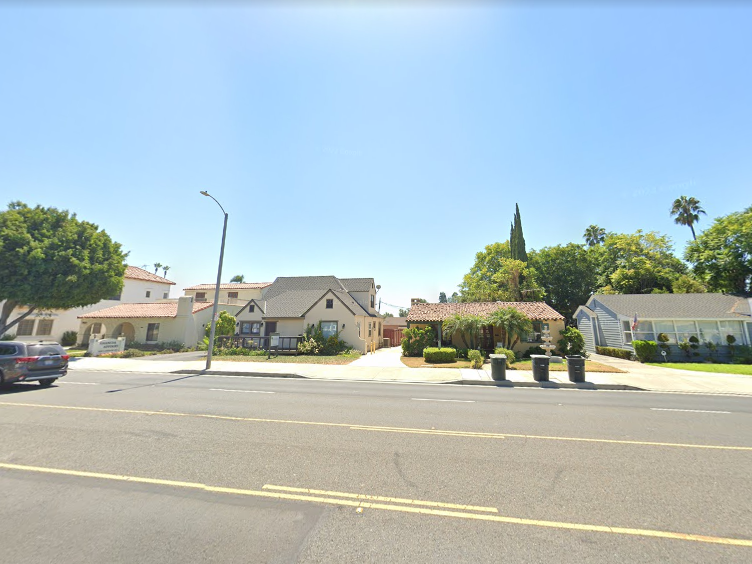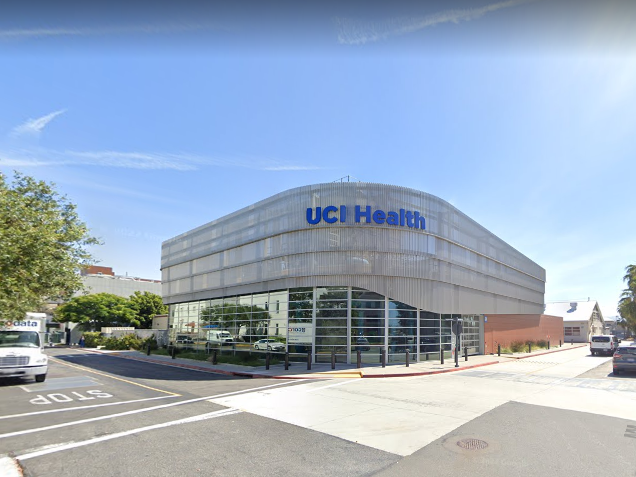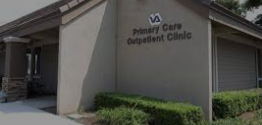Chapman House Inc

Contact Details
-
Name:Chapman House Inc
-
Address:1412 East Chapman Avenue
Orange, CA - 92866 -
Phone:714-288-9779
-
Email:
-
Website:
Description
There are currently state and federally funded or sponsored drug and alcohol treatment centers in the state of California
Questions & Answers
Help others like you find out more about Chapman House Inc. Do you know the answers to any of these questions? Contribute now and help others like you.
What kinds of care do they offer?
-
Substance use treatment
Refers to a broad range of activities or services, including identification of the problem (and engaging the individual in treatment); brief interventions; assessment of substance abuse and related problems including histories of various types of abuse; diagnosis of the problem(s); and treatment planning, including counseling, medical services, psychiatric services, psychological services, social services and follow-up for persons with alcohol or other drug problems (Institute of Medicine, 1990).
-
Treatment for co-occurring substance use plus either serious mental health illness in adults/serious emotional disturbance in children
Housing for individuals recovering from substance abuse that is designed to provide a drug and alcohol-free living environment and appropriate support services to facilitate movement to independent living. Such housing includes transitional living, sober houses, sober living, recovery houses, and 3/4 houses.
What opioid medications are used in treatment?
-
Buprenorphine used in Treatment
Buprenorphine is used in medication-assisted treatment (MAT) to help people reduce or quit their use of heroin or other opiates.
What types of opioid treatment do they provide?
-
Accepts clients using MAT but prescribed elsewhere
What types of treatment approaches do they offer?
-
Cognitive behavioral therapy
Involves recognizing unhelpful patterns of thinking and reacting, and then modifying or replacing these with more realistic or helpful ones. The therapy can be conducted with individuals, families, or groups, and clients are generally expected to be active participants in their own therapy.
-
Telemedicine/telehealth therapy
The ability for healthcare providers, working from a distance using telecommunications technology, to communicate with patients, diagnose conditions, provide treatment, and discuss healthcare issues with other providers to ensure quality healthcare services are provided. Other names used for this treatment approach are: e-medicine, e-therapy, e-psychiatry, and telepsychiatry.
-
Substance use disorder counseling
A short-term treatment that has been generalized for a variety of disorders including opiate drug dependence and cocaine abuse. The therapy includes supportive techniques which encourage the patient to discuss personal experiences, and expressive techniques, which enable the patient to work through interpersonal relationship issues and gain greater self-understanding.
-
Trauma-related counseling
Cognitive behavior techniques adapted for clients suffering from post-traumatic stress disorder (PTSD) and other effects of abuse and trauma.
-
12-step facilitation
A 12-step program is a support group made up of people who share the same addiction. The "12 steps" refer to the steps recovering addicts must take to overcome their addiction as part of this program. Attendees at group meetings share their experiences, challenges, successes and failures, and provide peer support for each other.
-
Brief intervention
A short-term intervention, usually one to five sessions, for substance abusers who are not yet dependent.
-
Contingency management/motivational incentives
Often used in the treatment of drug and alcohol abuse, the approach employs a positive-reinforcement treatment method in which patients are given rewards for constructive actions taken toward their recovery.
-
Motivational interviewing
A counseling approach which acknowledges that many people experience ambivalence when deciding to make changes. Its aim is not to focus immediately on the action of changing, but to work to enhance motivation to change.
-
Anger management
Uses strategies to address the anger cycle, conflict resolution, assertiveness skills, and anger-control plans. The goal of anger management is to reduce both emotional feelings and the physiological arousal that anger causes.
-
Community reinforcement plus vouchers
An intensive outpatient therapy in which individuals focus on improving family relations, receive vocational training, and learn a variety of skills to minimize drug dependency. An incentive program (vouchers whereby individuals can earn points exchangeable for retail items) is used to encourage individuals to remain in treatment and be abstinent.
-
Relapse prevention
A cognitive behavioral therapy developed for the treatment of problem drinking and adapted later for cocaine addicts. Cognitive behavioral strategies are based on the theory that learning processes play a critical role in the development of maladaptive behavioral patterns. Individuals learn to identify and correct problematic behaviors. Relapse prevention encompasses several cognitive behavioral strategies that facilitate abstinence as well as provide help for people who experience relapse.
-
Smoking permitted in designated area
A designated area in which smoking is permitted.
What type of setting is this location?
-
Outpatient
Describes patients who receive treatment services without an overnight stay at a treatment facility or hospital.
-
Outpatient day treatment or partial hospitalization
-
Intensive outpatient treatment
-
Regular outpatient treatment
What types of license or certifications or accreditation does this facility posses?
-
State Substance use treatment agency
Government organization responsible for planning, organizing, delivering, and monitoring substance use disorder services in their respective state.
-
State mental health department
Government organization responsible for planning, organizing, delivering, and monitoring critical mental health services in their respective state.
-
State department of health
-
Commission on Accreditation of Rehabilitation Facilities (CARF)
An independent non-profit accreditor of health and human services.
-
National Committee for Quality Assurance (NCQA)
Independent 501(c)(3) nonprofit organization in the United States that works to improve health care quality through the administration of evidence-based standards, measures, programs, and accreditation.
What types of payment or funding do they accept?
-
Cash or self-payment
Payment for treatment is made by the person directly, through cash or other means, rather than using health insurance.
-
Private health insurance
-
Federal, or any government funding for substance use treatment programs
Financial assistance provided by the federal, state, or local government for substance use treatment.
What language services are offered?
-
Spanish
Staff counselors provide treatment in Spanish.
What specific groups are treated here?
-
Clients with co-occurring mental and substance use disorders
Facility has a program or group specifically tailored for persons with co-occurring mental and substance abuse disorders.
-
Veterans
Facility has a program or group specifically tailored for Veterans.
-
Members of military families
Facility has a program or group specifically tailored for Military families.
-
Criminal justice (other than DUI/DWI)/Forensic clients
Facility has a program or group specifically tailored for clients referred from the court/judicial system.
-
Adolescents
Facility has a program or group specifically tailored for Adolescents.
-
Adult women
Facility has a program or group specifically tailored for adult women.
-
Adult men
Facility has a program or group specifically tailored for adult men.
-
Clients who have experienced trauma
Facility has a program or group specifically tailored for persons who have experienced trauma.
-
Young adults
Facility has a program or group specifically tailored for Transitional age young adults.
What ancillary services are offered at this facility?
-
Case management service
Helps people arrange for appropriate services and supports through a case manager who monitors the needs of clients/patients and their families and coordinates services, such as mental health, social work, health, educational, vocational, recreational, transportation, advocacy, and respite care, as needed.
-
Domestic violence services, including family or partner
Provide safety assistance to victims of domestic violence.
-
Mental health services
Assessment, diagnosis, treatment or counseling in a professional relationship to assist an individual or group in alleviating mental or emotional illness, symptoms, conditions or disorders.
-
Social skills development
-
Transportation assistance
What types of recovery support services are offered here?
-
Mentoring/peer support
-
Housing services
Are designed to assist individuals with finding and maintaining appropriate housing arrangements.
-
Employment counseling or training
Advises, coaches, provides information to and supports people who are planning, seeking and managing their life/work direction.
What specific pharmacotherapy treatments do they provide?
-
Non-nicotine smoking/tobacco cessation
Are medications that do not contain nicotine but act on the brain to reduce a person's craving for tobacco. Some common medications are Bupropion (Zyban, Wellbutrin), and Nortriptyline (Pamelor). Medications are often prescribed in conjunction with behavioral counseling or support groups to provide the best chance for achieving long-term smoking abstinence. (http://www.mayoclinic.com)
-
Buprenorphine with naloxone
A prescription medication that combines buprenorphine (which helps relieve symptoms of opiate withdrawal) and naloxone (reverse the effects of narcotics) used to treat opioid addiction.
-
Buprenorphine without naloxone
An opioid used to treat opioid addiction by relieving the symptoms of withdrawal. It can be used under the tongue, by injection, as a skin patch, or as an implant.
-
Clonidine
-
Medication for mental disorders
What types of screening and assessment methods are used here?
-
Screening for tobacco use
Determines a client's use of tobacco products, such as cigarettes, cigars, pipe tobacco, or smokeless tobacco. It is generally recommended that providers screen for tobacco use on a regular basis by asking clients, as they are seen, about their current and past use of tobacco products and their exposure to secondhand smoke or tobacco.
-
Comprehensive mental health assessment
An examination used to ascertain whether or not a patient is functioning on a healthy psychological, social, or developmental level. It can also be used to aid diagnosis of some neurological disorders, specific diseases, or possible drug abuse.
-
Comprehensive substance use assessment
-
Interim services for clients
-
Outreach to persons in the community
-
Screening for mental disorders
Test to determine whether a person is experiencing symptoms of mental health conditions and needs treatment.
-
Screening for substance use
Test to determine whether a person is experiencing symptoms of substance use and needs treatment.
What kinds of education and counseling services are offered here?
-
Smoking/vaping/tobacco cessation counseling
Includes interventions for persons who use tobacco and want help with stopping, including behavioral support or counseling in groups or individually.
-
Individual counseling
Process through which clients work one-on-one with a trained mental health clinician in a safe, caring, and confidential environment.
-
Group counseling
Form of therapy where people with similar experiences/issues come together with a professional therapist.
-
Family counseling
A type of psychological counseling (psychotherapy) that can help family members improve communication and resolve conflicts.
-
Marital/couples counseling
-
HIV or AIDS education, counseling, or support
Access to education, counseling, and support groups to ?at risk? individuals and also individuals who have been infected with the virus.
-
Health education services other than HIV/AIDS or hepatitis
Any combination of learning experiences designed to help individuals and communities improve their health, by increasing their knowledge or influencing their attitudes.
-
Substance use disorder education
What other types of addiction do they treat?
-
Treatment for gambling disorder
-
Treatment for other addiction disorder
Treatment for behavioral addictions or process addictions and occur when a person is dependent upon a specific behavior (i.e. gambling addiction, compulsive shopping disorder, etc.).
What genders are accepted here?
-
Female
-
Male
What kinds of transitional services do they provide if any?
-
Aftercare/continuing care
-
Discharge Planning
A process that aims to improve the coordination of services after discharge from the hospital by considering the patient?s needs in the community.
-
Naloxone and overdose education
-
Outcome follow-up after discharge
What types of testing do they offer?
-
Breathalyzer or blood alcohol testing
A device for estimating blood alcohol content (BAC) from a breath sample.
-
Drug or alcohol urine screening
Analyzes your urine for the presence of certain illegal drugs and prescription medications.
-
TB screening
Skin tests that are used to screen people who are at high risk for TB exposure such as people with diseases or conditions that weaken their immune system.
Who provides the opioid medications used in treatment?
-
No formal relationship with prescribing entity
What types of alcohol abuse treatment are available at this facility?
-
Does not treat alcohol use disorder
Who is responsible for the operation of this facility?
-
Federal Government
Is vaping allowed at this facility?
-
Vaping permitted in designated area
How do I apply for admission at this location?
Have you been to this facility? What was your experience?
Is there a wait-list for treatment center?
Is any payment required?
Related Posts
UC Irvine Health
- Orange, CA
- 2.96 miles away
Long Beach VAMC
- Santa Ana, CA
- 5.09 miles away


